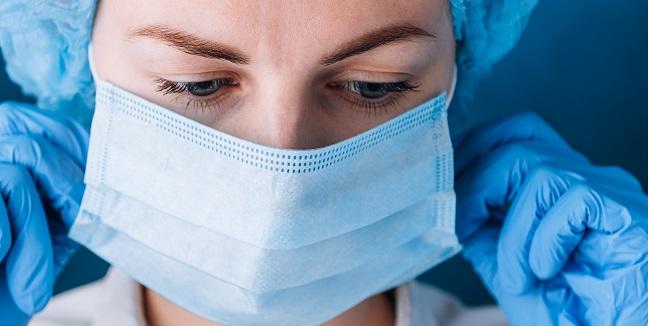Face Masks UK: How & When To Wear Yours
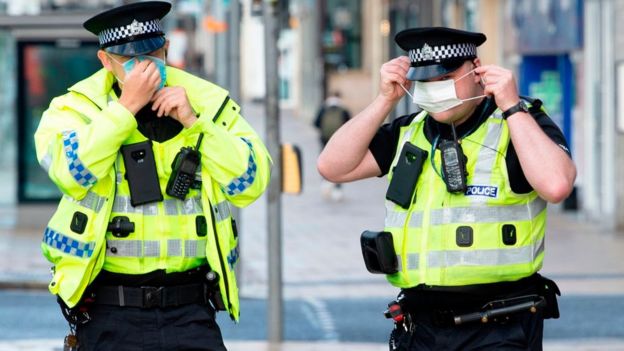
Face masks UK: this has been one of the most controversial topics in the past few months.
On May 11, the government released new guidelines, recommending the use of face coverings in places such as public transport or in shops. On July 24, wearing a face mask has become mandatory in shops, restaurants and supermarkets. What do we know about the new government’s deadline? And what kind of mask should you wear? In this article, we have investigated the matter, and finally found some answers to some of the most popular questions.
Face Masks UK: Everything We Know
On July 13 that prime minister Boris Johnson announced that Face masks UK would also become mandatory in shops and supermarkets in England from July 24. Since that moment, many questions have arisen.
For example, shops can refuse entry to anyone not wearing a face mask, and fines up to £100 can be issued. Nevertheless, some people seem to be exempt from covering their face while in public spaces.
What About Face Coverings In Scotland?
In Scotland, the use of face coverings in shops has been mandatory since 10 July.
First Minister Nicola Sturgeon said she hopes people would stick to the law because they understand this is the right thing to do. She also added:
“Please everybody complies with this because it is for the good of all of us. It will help keep us safe and protect everybody. […] The reason is quite simple – we’re now starting to go out and about a lot more, and that brings a much greater risk of the virus spreading. […] So, we have to put in place now mitigations that weren’t as necessary when we were all staying at home all of the time.”
Source/ TCTMD
Face Masks UK: Wales And Northern Ireland Regulations
In Wales, three-layer face coverings are mandatory on public transport since 27th July.
First Minister Mark Drakeford said:
“For the sake of simplicity and consistency, as well as being part of our plan to help reduce the risk of transmission while on public transport where it is not always possible to maintain a two-metre physical distance, it will become mandatory for people to wear a three-layer face covering while travelling – this includes taxis.”

Source/ DailyPost
In Northern Ireland, face coverings are not mandatory yet. The local chair of the British Medical Association (BMA) has recently announced that people in Northern Ireland will be asked to cover their face and mouth where social distancing is difficult “In the coming weeks”.

Source/ BBC
At the moment, there are several guidelines to remember and respect when it comes to face masks UK. Nevertheless, face coverings are still one of the best and easiest ways to protect ourselves and others from the virus.
COVID-19 And Face Masks In The UK
The WHO (World Health Organisation) has confirmed that the virus can easily spread from person to person throughout the following ways:
- Between two people who are in close contact.
- Through respiratory droplets (produced when we sneeze, cough or talk).
Infected droplets can easily land in our mouths and noses or be inhaled into our lungs. This is the reason why the regulation about face masks UK has changed to help our community fights against the virus.
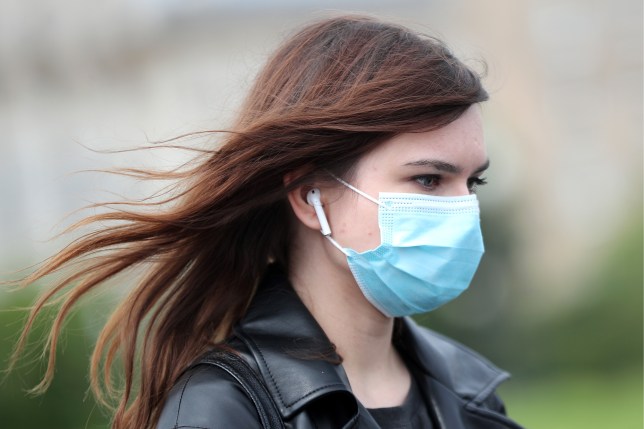
Source/ Metro
It must be noted that the virus can be spread by people who are not showing symptoms. This means that we should all wear masks, even if we are reasons to believe that we are not sick.
What Can I Do To Reduce The Spread Of Infection?
Since there is currently no vaccine to prevent the disease, the best way to stop the spread of infection is to avoid being exposed to it.
As more shops and workplaces have reopened, handwashing is more important than ever.
When you get home from being outside, wash your hands with soap and water for 20 seconds.
Follow official NHS advice:
➡️ https://t.co/HN2brbBNgc pic.twitter.com/klAYn3iYzK— Department of Health and Social Care (@DHSCgovuk) July 28, 2020
To make sure you and all the people around you are protected against the virus, you should:
- Wash your hand with soap for at least 20 seconds. This is especially important after you blow your nose, sneeze or cough. Always wash your hands before eating, handling food, touching animals, and entering or leaving a public space.
- If water and soap are not immediately available, you must use a hand sanitizer. Only products which contain at least 60% of alcohol are effective against the virus. Cover your hand with the product and rub them together until completely dry.
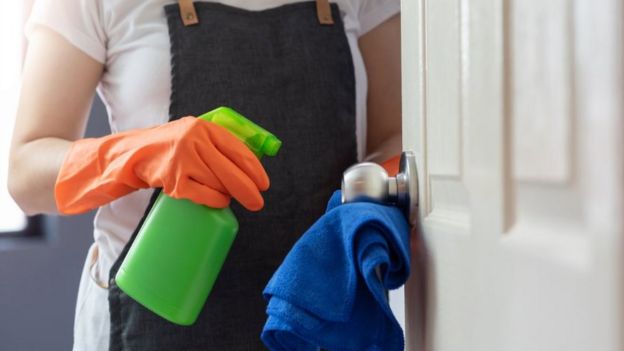
Source/ BBC
- Never touch your eyes, nose and mouth with unwashed hands.
- Avoid close contact with people who are sick or who don’t live in your household.
- Wear your face covering when around others and in public settings.
As you can see, face masks UK are only a part of the strategy to eliminate the virus, but they are very important!
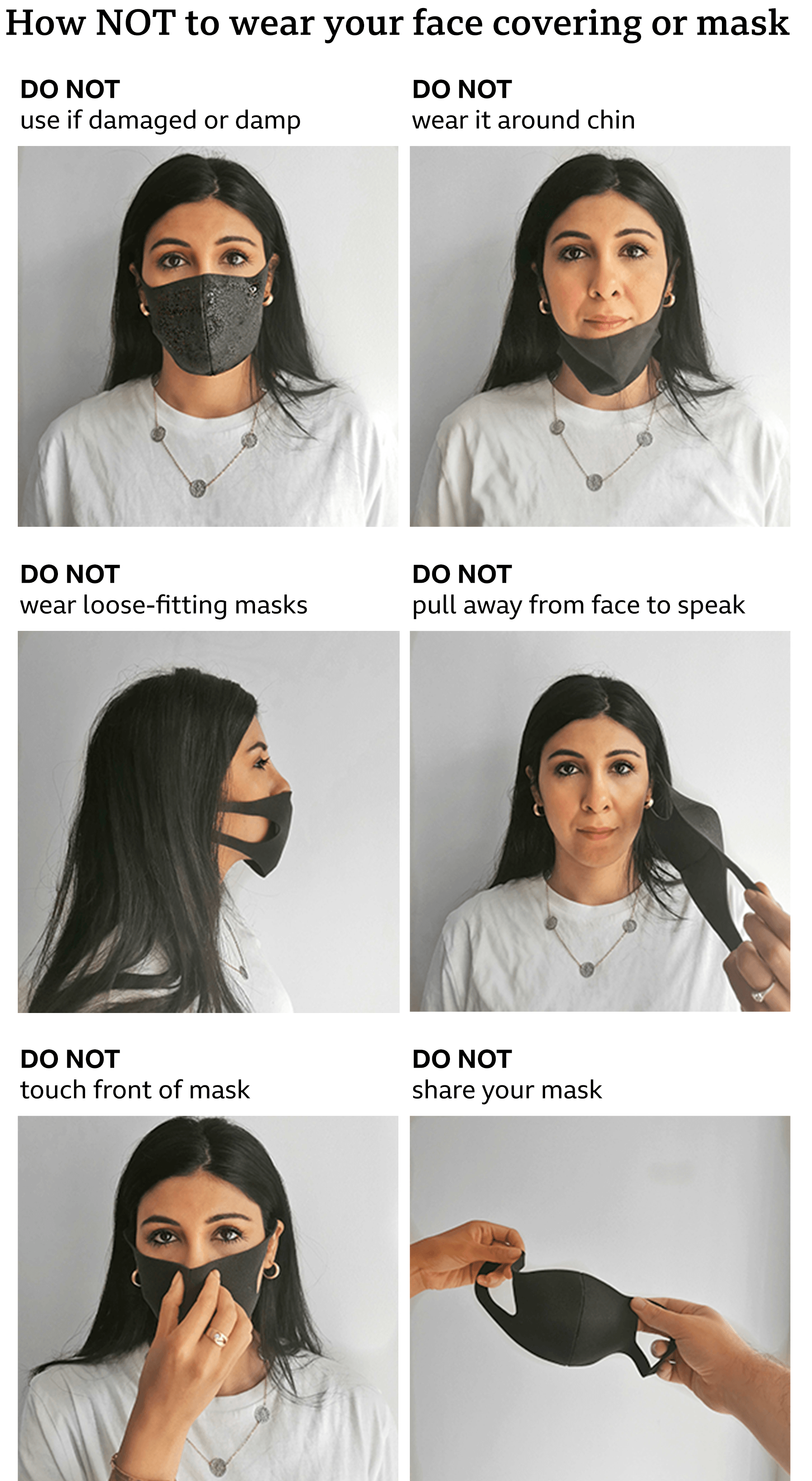
Source/ Royal Devon and Exeter NHS Foundation Trust (BBC)
Face Masks UK: All The New Rules
You must wear your face mask or face covering immediately before entering an indoor setting, and keep it until you leave.
You are allowed to remove your face covering to eat and drink if reasonably necessary. For example, you are not required to wear a face mask in food courts and restaurants. However, you must put your face covering back on once you leave the seating area.
Face masks come in different sizes and adjustable straps. You should use the elastic straps to secure the face covering on your ear loop so that your face is always covered and protected.
Face Masks UK: What Can I Wear?
In the context of the COVID-10 outbreak, a face covering, or face mask is something that safely covers the nose and mouth.
This means that, based on the latest government guidelines, you can wear single-use or reusable face masks, as well as scarves, bandanas, religious garments, or any type of hand-made cloth. Your face covering must securely fit around the side of your face, and protect your nose and mouth.
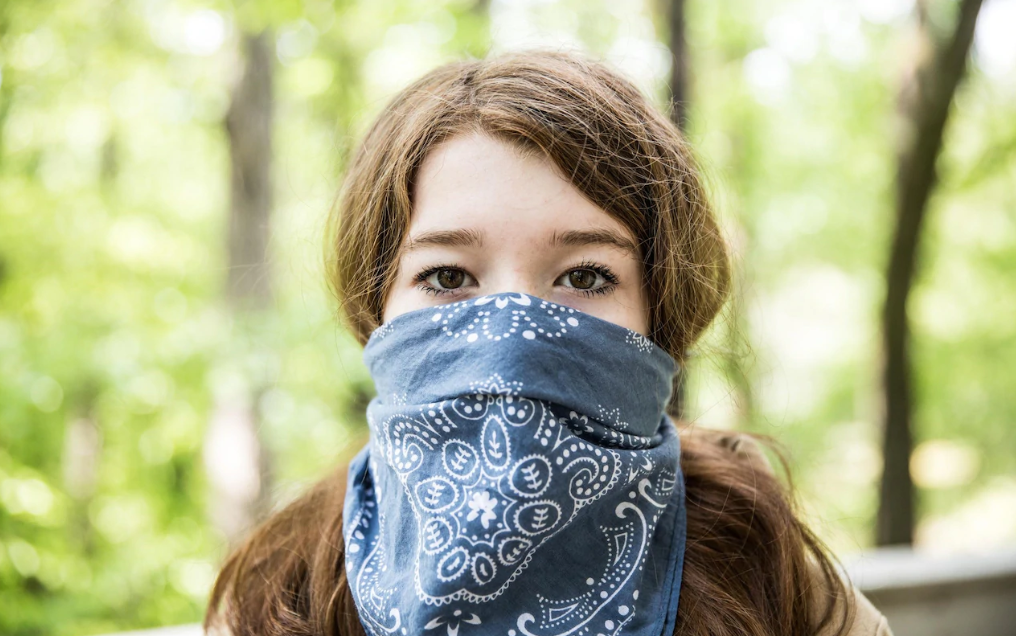
Source/ Telegraph
It must be noted that eligible face coverings must not be classified PPE (Personal Protective Equipment). These masks are used in specific situations (such as medical and industrial settings) to protect wearers against hazards and risks. This includes surgical masks and respirators.
Why We All Need To Wear a Face Mask?
Wearing a face mask is the best way to protect others against the spread of infection. Our nose and mouth are the main confirmed sources of transmission of the virus, which can be in our bodies even if we don’t show any symptoms.
Heading to the shops? Don’t forget your face covering.
It must fully cover your nose and mouth.
Tap the image below to visit our site where you can learn more ⬇️
#GotItCovered— Department of Health and Social Care (@DHSCgovuk) July 30, 2020
When To Wear A Face Mask
At the moment, different regulations exist for face masks UK.
For example, in England you must wear a face covering in the following situations:
- Public transport
- Shops and supermarkets
- Airports, rail and tram stations, and other indoor transport hubs
- Banks
- Post offices
- Indoor shopping centres
- NHS settings, including hospitals, community care settings, and GP surgeries
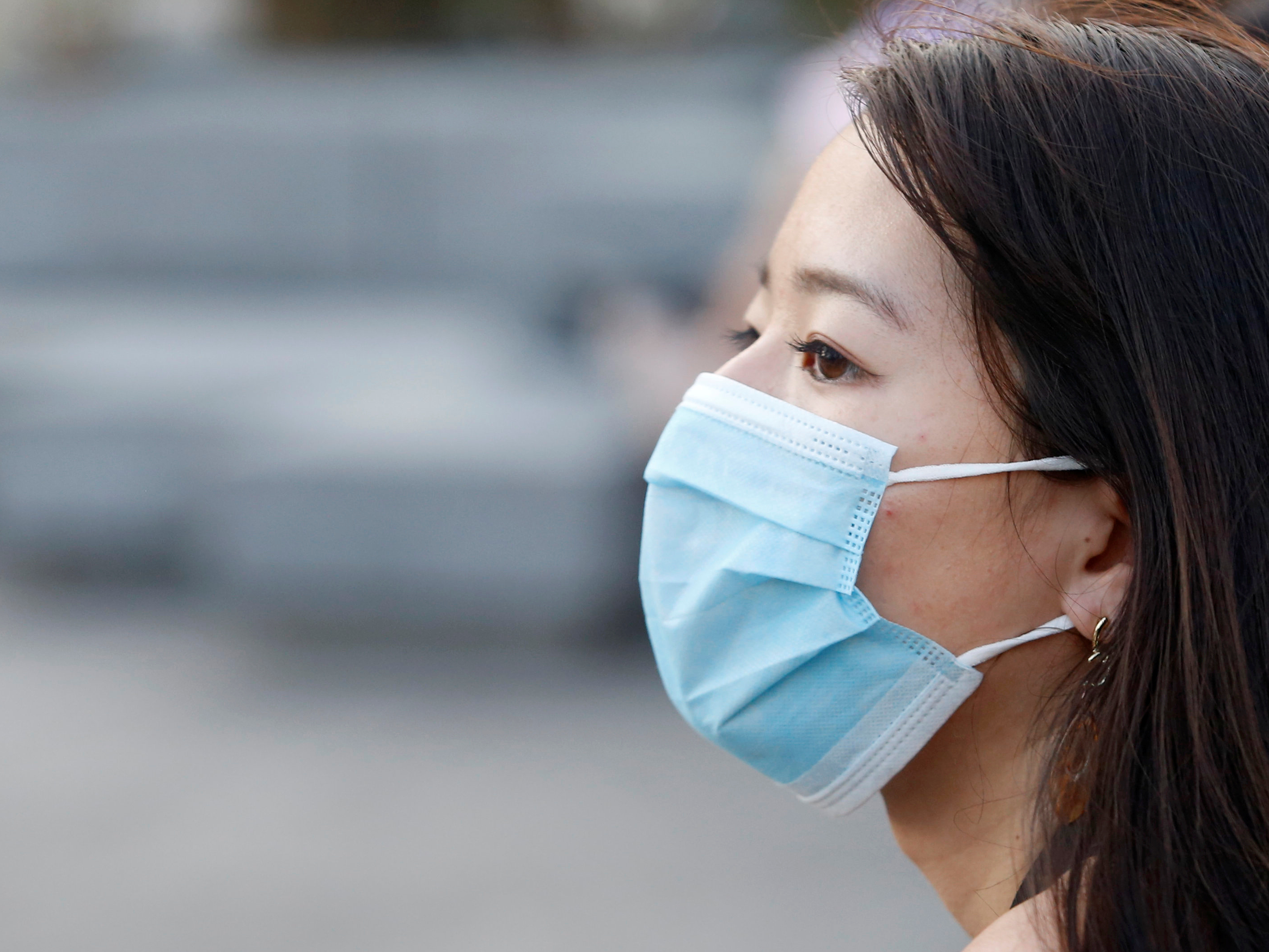
Source/ Coda Pharmacy
Besides, you are strongly encouraged to wear your face covering in any situations where social distancing may be difficult or even impossible. This includes settings where you are most likely to come into contact with people outside your household or you do not normally meet.
Does It Matter What Sort Of Mask You Wear?
Yes! There are different types of mask available on the market, and they all offer different levels of protection.
For example, surgical-grade N95 masks offer the highest level of protection against COVID infection, and they are mainly used by medical professionals. These masks, together with surgical-grade ones, are costly and in limited supply. In addition, they are uncomfortable to wear for long periods.
For this reason, you should wear a different type of mask or face covering which has more layers, to protect you against the virus.
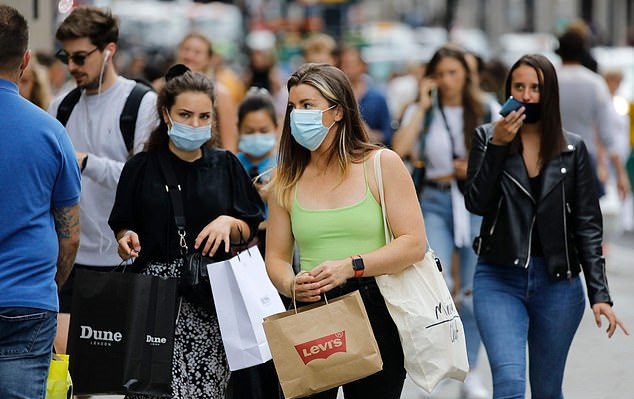
Source/ Daily Mail
When You Do Not Need To Wear a Face Covering
Although face masks are mandatory in any shops and supermarkets, they are not required in the following settings:
- Hospitality premises, including restaurants with table service, bars, and pubs
- Cinemas, casinos and other entertainment venues
- Gyms and other indoor exercise and sports venues
To make sure you always wear a face mask when required, you can check signage upon entry and exit of any premise.
How To Choose The Best Face Masks UK
Unless you are self-isolating and you are not supposed to leave your home for a while, you will be required to follow the face masks UK guidelines. This means that you will need to wear your face covering in several settings.
Since we still don’t know how long face masks will be mandatory for, we need to invest our money in a proper face covering. This means that you must find the most comfortable, high quality face masks for your needs. For example, if you wear glasses, you need a face covering which can sit comfortably on your nose bridge.
Organic cotton face coverings are usually breathable and suitable for those who need to cover their nose and mouth for extended periods. We also recommend machine washable face masks UK, which are available in many shops and you can even pre order yours online.
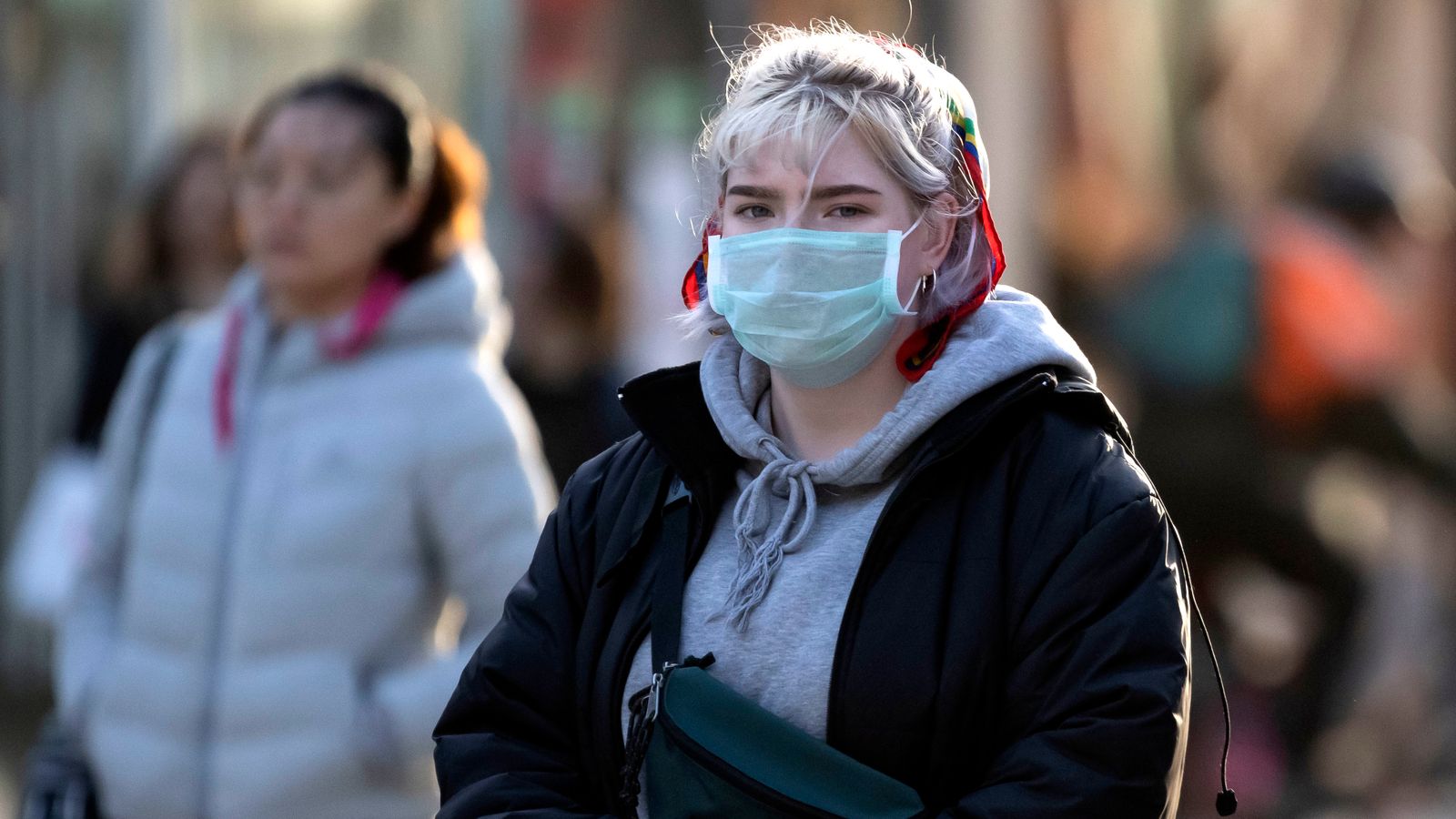
Source/ Sky News
Where To Buy Your Face Covering
Expensive and more popular brands are necessary better when it comes to choosing your new face masks UK. In other words, you don’t need Billie Faiers’ net worth to find an excellent mask, which can protect you from the virus.
For example, Taobao and Aliexpress, two of the most popular Chinese online retailers, offer hundreds of thousands of different mace masks. Nevertheless, if you don’t wish to wait too long to get your mask in your mail, you can buy yours from Zalando, Asos and many other online shops.
If you have an old t-shirt or scarf at home, you can even make your face mask. This is the best way to save some money, have fun with your new DIY project, and look as stylish as Miss Hoolie.
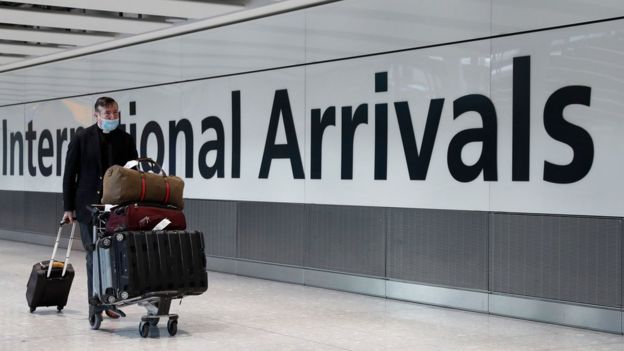
Source/ BBC
The Importance Of Wearing Our Face Masks UK
Several shops sell medical grade masks. These particular face coverings have at least a 95% droplet filtration system as they consist of multiple layers. They are made of non-woven materials, such as polypropylene or cellulose. These masks are often used in NHS charities or other charity helpforce settings.
A proper face mask should be double layered to safely cover your nose and mouth and protect others from the spread of the virus.
No matter if you choose an animal print or a single-use face covering: by wearing your face mask, you are protecting your community and joining the fight against the virus!
How To Make Your Own Face Mask
Now that face masks UK are mandatory, we are all looking for a face covering which is comfortable yet stylish.
Whether you are handy with a sewing machine, or you want to try a new DIY project, here are some tips to make your own face covering. There are several ways to obtain one from an old piece of fabric. Don’t forget that the more layers of material the better.
Research has shown that the best materials to use are woven cotton, natural silk or quilted cotton material.
You can make your own face mask at home by folding a bandana and with the help of an elastic band. Otherwise, you can cut up an old t-shirt, pin it together and have your unique face covering.
You MUST now wear a face covering in all shops in England 😷
Help to keep shops open and safe ✅
Remember you do not need to wear a face covering if you have a legitimate reason not to.
Learn more👇🏼https://t.co/K3df5UWunn pic.twitter.com/4614WCwnoy
— Department of Health and Social Care (@DHSCgovuk) July 29, 2020
Are Face Masks Environmentally Friendly?
The majority of single-use masks are made of several layers of plastics. According to an analysis by scientists at University College London, if every person in the UK used one single-use face mask each day for a year, an extra 66,000 tonnes of plastic waste would be created.
For this reason, we should all prefer reusable masks and face coverings, made of fabric. they perform even better than most single-use masks and do not cause any waste stream. Besides, it is very easy to make your face mask at home by reusing an old t-shirt, bandana or scarf.
How To Take Your Mask Off Safely
First of all, you must always wash your hand before wearing your mask. It must cover your mouth and nose, and you need to make sure that there are no gaps between your face and the mask.
Avoid touching the mask while using it and, if you need to do it, always wash your hands with soap and water, or use hand sanitiser. If your mask is damp or if you touch it with uncleaned hands, you must replace it as soon as possible.
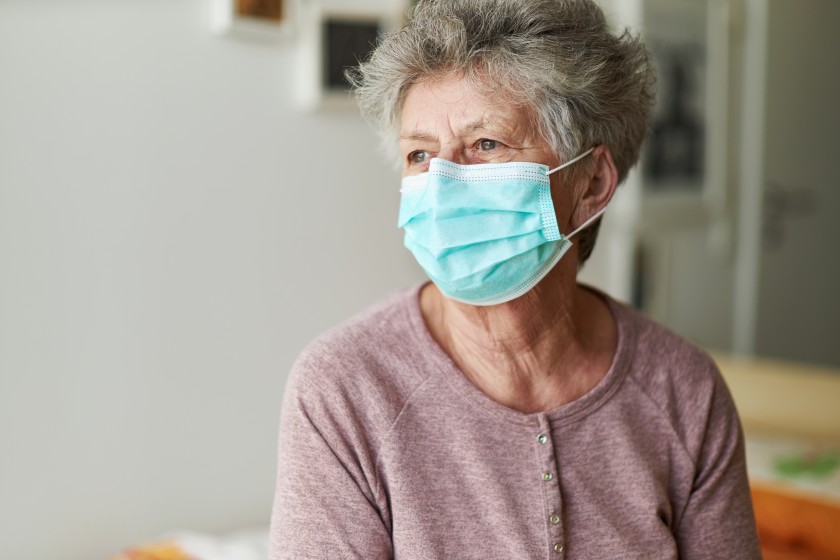
Source/ The San Diego Union Tribune
To remove your mask, you should take it off using the elastic tags. Avoid touching the front of the face covering. If you were wearing a single-use face mask, you need to discard it immediately into a bin. If the mask is reusable, you can wash it into your washing machine.
Reusable masks should be washed after each use, or at least routinely.
Paper Surgical Single-Use Masks Or Cloth Masks: Which Face Masks UK Are Better?
At the moment, doctors are still trying to find out which masks are the best and the extent to which they protect both the wearer and those around them. In other words, there is no evidence that surgical face masks are better than cloth face coverings.
The typical size of viruses and bacteria is 0.3-1 .0 microns in diameter. Face masks made of multiple layers provide better protection against these droplets than scarves and bandana.
Nevertheless, according to the US Centers for Disease Control and Prevention (CDC), any type of face-covering must always provide a tight-fitting around our face. This means that even a bandana temporarily used as a face mask is better than no covering at all.
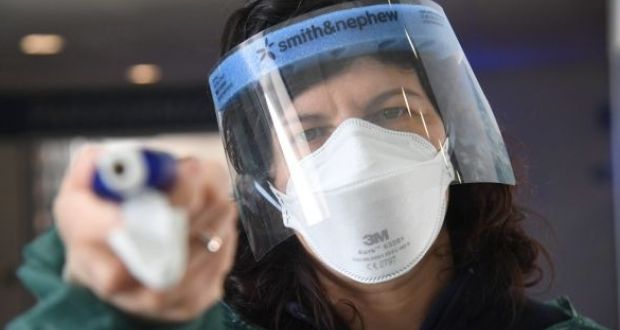
Source/ The Irish Times
Do Britons Wear Their Face Masks?
A recent survey has shown that there had been a significant shift between May and July. At the moment, 40 per cent of UK residents aged 16 to 75 feel comfortable with their children returning to school. In May, only a third of these parents were willing to send their kids back to school.
Besides, Some 70 per cent of people are now wearing a face mask, whereas only 19 per cent of Britons were covering their faces in April. Although one in ten believe face masks are bed for your health, 91 per cent of the population thinks that face coverings can help reduce the spread of the virus.
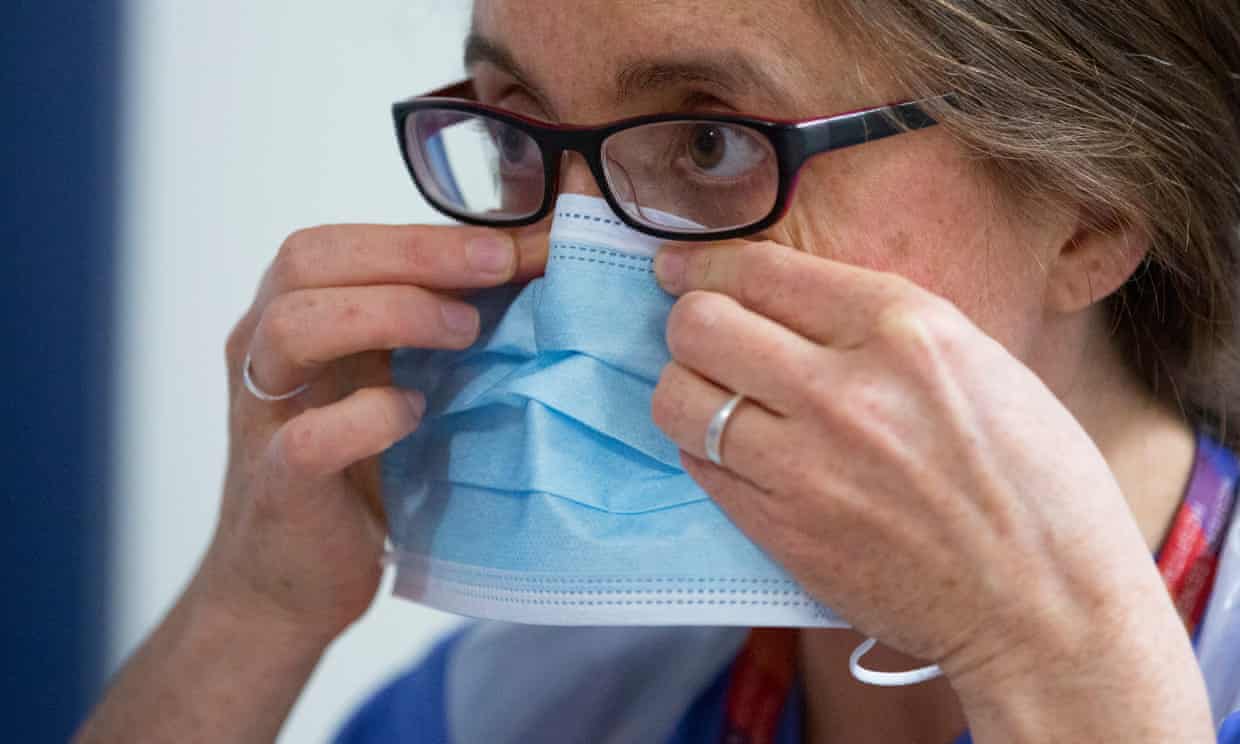
Source/ Guardian
